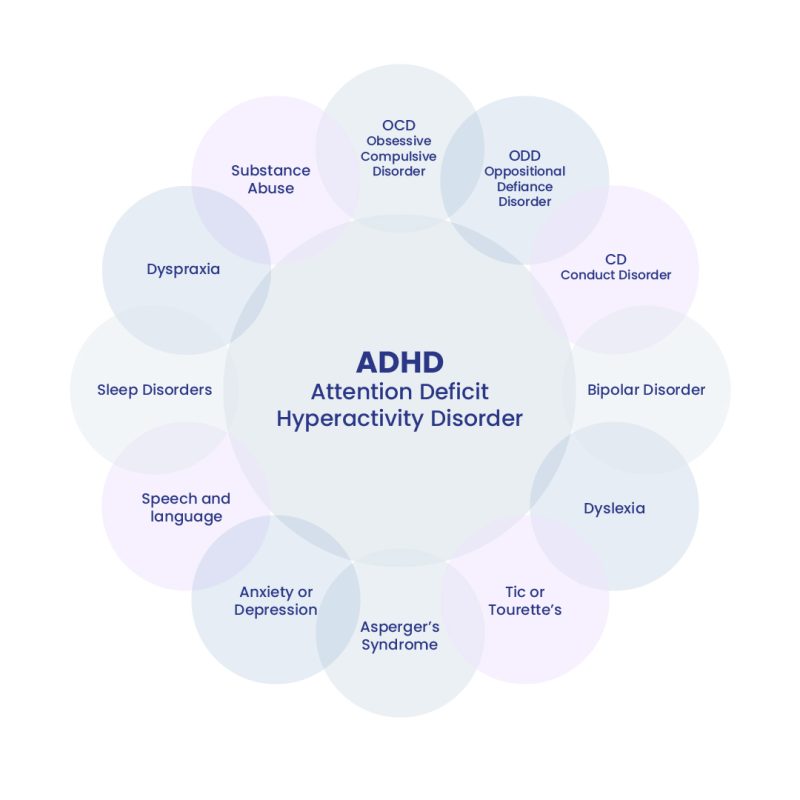Welcome to the Psychiatry-UK Adult ADHD service
We believe that we are now the biggest provider of adult ADHD assessments in the UK.
What is ADHD?
ADHD stands for Attention Deficit (Hyperactivity) Disorder. It is a neuro-developmental condition, so it develops as your brain develops, in childhood. It is often associated with (co-morbid with, as doctors put it), other neurodevelopmental conditions such as dyspraxia, dyslexia, Tourette’s syndrome and what are generally called autistic spectrum disorders.
These co-morbidities can easily mask or counteract some of the more obvious symptoms of ADHD, and an experienced psychiatrist will be well aware of this.

As well as being a neuro-developmental condition, in adults, ADHD is also commonly linked or co-morbid with mental health conditions such as anxiety or depression, where the underlying ADHD has been masked for years by the associated problems that it has resulted in.
A truly shocking statistic is that around 40% of those in prison reach the threshold for diagnosis of adult ADHD and most adults with undiagnosed ADHD will have developed and often sought help for other social problems and mental health conditions.
3 Recognised Sub-types of ADHD
1. Hyperactive – Normally associated with impulsive behaviour and that commonly perceived lack of control in children that has allowed some to dismiss the diagnosis as just bad behaviour and the result of poor parenting. The hyperactive behaviour tends to become more easily controlled as a child goes through adolescence – and to become a more generalised restlessness and/or irritability. This is perhaps why there used to be a belief that ADHD was only found in children. In the last 20 years we have understood that this is not really true.
2. Inattentive – Which is now more commonly known as ADD. Where sufferers mainly experience difficulties staying focused and attending to daily, mundane tasks without being distracted, perhaps moving from one activity to another or becoming bored quickly. In children this is often missed as the resulting behaviour – daydreaming, inattentiveness, underachievement – can be dismissed as laziness or even praised as imaginative but unfulfilled potential.
2. Combined – As the name suggests, where there is a combination of inattention and hyperactivity. In most cases, this is probably the best description of most people with ADHD as they really have a spectrum of types of behaviour, any of which, on their own, could be regarded as quite “normal”, but which when part of a larger picture, lead to a diagnosis of ADHD.
Common Perceptions and Misunderstandings about ADHD
That common perception of ADHD, of badly behaved little boys being disruptive in class, is a huge element of the stereotypical prejudice in the way many parents and teachers react to a diagnosis or even a suggestion that a diagnosis should be considered for their child.
The familiar perception is of the most visible sign of ADHD which is at its most florid in young boys. Young girls (and older ones), can also have ADHD but are less likely to be diagnosed, both because they show less hyperactivity and because the present statistics show that ADHD is more prevalent among boys by a factor of about 2 or 3 to 1 – (though this may be partly due to these historic prejudices.)
This common (mis)understanding of Attention Deficit Hyperactivity Disorder often leads to treatment of the condition with stimulants which are chemically similar to some recreational drugs – and which can have adverse effects on those without the condition. It is important to note that they do not give the sort of “rush” that those who use stimulants recreationally desire.
In fact, the medication has positive effects for over 80% of those with ADHD who try them. They are not addictive, whereas those with untreated ADHD are highly vulnerable, as they become adults, to succumbing to addiction – often by using illegal drugs to self-medicate. The research evidence is that medicating for ADHD actually reduces substance abuse.
ADHD Treatment (First Steps)
If you think you have ADHD, the first step to getting treatment is to receive a diagnosis from a specialist doctor. This is generally a psychiatrist with considerable experience of working in the field of neurodevelopmental conditions.
Although ADHD is usually a lifelong condition, it is also a very treatable condition – 80% of people with ADHD respond very positively to medication and, with better understanding of the condition, can usually learn to manage the difficulties that they would otherwise face. However, only with a specialist diagnosis can these medications be accessed. Whilst ADHD medications are highly effective, they are stimulants which are “controlled” drugs. You need a special type of prescription from a specialist ADHD clinician. GP’s typically continue to prescribe these, provided a specialist ADHD clinician has made a formal diagnosis of ADHD, and you are stable on your ADHD treatment.
Even with a diagnosis from a specialist psychiatrist, not all GP’s will agree to prescribe ADHD medication. It is advisable to discuss with your GP whether they will help, before booking an appointment with us. We will always do our best to help you to get your GP to work with us in a shared care model.
Getting a diagnosis through Psychiatry-UK
NHS patients
If you live in an area where we have an NHS contract, you can definitely see us via the NHS. If you live in England we would be happy to work with you and your GP to seek funding from your local Integrated Care Board (ICB) for us to provide you with a diagnosis as you have the right to choose to use us. Find out more about your Right to Choose here.
Currently, the relevant NHS commissioning authorities in Scotland, Wales or Northern Ireland have not agreed to fund anyone to receive our services. However, we will try our best to help anyone who lives anywhere in the UK to receive our service via the NHS.
Private patients
We have now launched our Private Adult ADHD service including ADHD assessments and optional titration.
View more here now
First Step – Diagnosis
Before you see the doctor, we will send out some pre-assessment forms for you to complete. These need to be returned to us at least 72 hours before your assessment. There are four simple forms: one is a rating scale for adult ADHD, one is about your heart health, another is to obtain the background story of how you are struggling, and the fourth is for someone who knows you well to complete; perhaps a relative, or your partner, maybe a friend, or even someone from work. Some people feel anxious about this part of the process, either because they worry about what others will say, or don’t want to reveal that they think they have ADHD, or perhaps because they don’t think they have anyone suitable to fill in the form. In the end, it won’t be crucial. If you cannot provide this fourth form, we might have to do some extra tests, but we will work it out for you.
What happens during the consultation
It is natural to feel apprehensive about a first consultation with a psychiatrist, but there really is no need to worry. Our psychiatrists are skilled at helping you feel comfortable and at ease – and you are going to be able to set it up so you are in a safe and comfortable place to talk. That is the huge benefit of working online. The psychiatrists all have huge experience of ADHD, in all of its variety, and they have also had direct experience of all of the other conditions with which ADHD can be confused.
It is not a test – you just need to be yourself. Your psychiatrist will go through your history with you, which will include clarifying your current difficulties as well as obtaining detailed background information from you. If they have any doubts about whether you have ADHD, they may ask you to take further tests, or seek more corroborative evidence by talking to people who know you well. Usually the doctor will be pretty certain within the first few minutes of the consultation starting whether you have ADHD, and the rest of the consultation is really about confirming the hypothesis and teasing out the details of your particular issues so as to best advise you on obtaining help and support in the future.
After Diagnosis – Medication and Titration
After diagnosis, if you choose to try medication, you will need to go through a process called titration where you have frequent contact with a clinician to judge what is the best medication and dosage for you.
The importance of psychosocial interventions
People with ADHD can have wonderful talents, but there is also a huge range of adverse effects on your thinking or behaviour patterns which are associated with having the condition. It really needs more than just taking the medication to learn about your ADHD self. You need to learn how to build on the strengths and overcome the consequences of the impairments associated with ADHD. There is a lot of evidence that receiving high-quality specialist coaching is very important – in fact it can transform your life.
For some people, it can be hard to repair the damage of half a lifetime without treatment. Exploring therapeutic models such as mindfulness or Cognitive Behavioural Therapy, when done with accredited ADHD specialists, helps with residual symptoms and is especially important in managing comorbid disorders such as depression and anxiety.
Once you are on the correct medication, receiving the best psychosocial support is what we would always suggest.
Further Reading
If you are now seeking some further information, these books are all on our bookshelves and recommended:
- More Attention, Less Deficit (Tuckman)
- The ADHD Effect on Marriage or The Couple’s Guide to Thriving with ADHD (Orlov)
- Driven to Distraction (Hallowell and Ratey)
- ADD Friendly Ways to Organize Your Life (Kohlberg / Nadeau)
- Women with Attention Deficit Disorder (Solden)
Are you looking for:
Adult ADHD – Understanding the Condition and Getting Help
Living with ADHD as an adult can be overwhelming. Many people spend years struggling with focus, organisation, or impulsivity before realising ADHD could be the cause. If this sounds familiar, you are not alone – and support is available.
At Psychiatry-UK, we are one of the UK’s leading providers of adult ADHD assessments and treatment. Every week, we help people gain clarity, access effective treatments, and start thriving.

